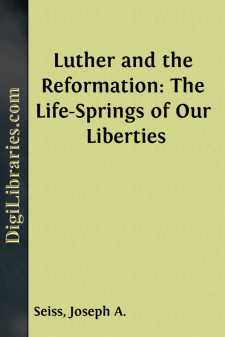Categories
- Antiques & Collectibles 13
- Architecture 36
- Art 48
- Bibles 22
- Biography & Autobiography 813
- Body, Mind & Spirit 142
- Business & Economics 28
- Children's Books 16
- Children's Fiction 13
- Computers 4
- Cooking 94
- Crafts & Hobbies 4
- Drama 346
- Education 46
- Family & Relationships 57
- Fiction 11829
- Games 19
- Gardening 17
- Health & Fitness 34
- History 1377
- House & Home 1
- Humor 147
- Juvenile Fiction 1873
- Juvenile Nonfiction 202
- Language Arts & Disciplines 88
- Law 16
- Literary Collections 686
- Literary Criticism 179
- Mathematics 13
- Medical 41
- Music 40
- Nature 179
- Non-Classifiable 1768
- Performing Arts 7
- Periodicals 1453
- Philosophy 64
- Photography 2
- Poetry 896
- Political Science 203
- Psychology 42
- Reference 154
- Religion 513
- Science 126
- Self-Help 84
- Social Science 81
- Sports & Recreation 34
- Study Aids 3
- Technology & Engineering 59
- Transportation 23
- Travel 463
- True Crime 29
Luther and the Reformation: The Life-Springs of Our Liberties
by: Joseph A. Seiss
Categories:
Description:
Excerpt
LUTHER AND THE REFORMATION.
A rare spectacle has been spreading itself before the face of heaven during these last months.
Millions of people, of many nations and languages, on both sides of the ocean, simultaneously engaged in celebrating the birth of a mere man, four hundred years after he was born, is an unwonted scene in our world.
Unprompted by any voice of authority, unconstrained by any command of power, we join in the wide-ranging demonstration.
In the happy freedom which has come to us among the fruits of that man's labors we bring our humble chaplet to grace the memory of one whose worth and services there is scarce capacity to tell.
Human Greatness.
Some men are colossal. Their characters are so massive, and their position in history is so towering, that other men can hardly get high enough to take their measure. An overruling Providence so endows and places them that they affect the world, turn its course into new channels, impart to it a new spirit, and leave their impress on all the ages after them. Even humble individuals, without titles, crowns, or physical armaments, have wrought themselves into the very life of the race and built their memorials in the characteristics of epochs.
History tells of a certain Saul of Tarsus, a lone and friendless man, stripped of all earthly possessions, forced into battle with a universe of enthroned superstition, encompassed by perils which threatened every hour to dissolve him, who, pressing his way over mountains of difficulty and through seas of suffering, and dying a martyr to his cause, gave to Europe a living God and to the nations another and an everlasting King.
We likewise read of a certain Christopher Columbus, brooding in lowly retirement upon the structure of the physical universe, ridiculed, frowned on by the learned, repulsed by court after court, yet launching out into the unknown seas to find an undiscovered hemisphere, and opening the way for persecuted Liberty to cradle the grand empire of popular rule amid the golden hills of a new and independent continent.
And in this category stands the name of Martin Luther.
He was a poor, plain man, only a doctor of divinity, without place except as a teacher in a university, without power or authority except in the convictions and qualities of his own soul, and with no implements save his Bible, tongue, and pen; but with him the ages divided and human history took a new departure.
Two pre-eminent revolutions have passed over Europe since the beginning of the Christian era. The one struck the Rome and rule of emperors; the other struck the Rome and rule of popes. The one brought the Dark Ages; the other ended them. The one overwhelmed the dominion of the Cæsars; the other humiliated a more than imperial dominion reared in Cæsar's place. Alaric, Rhadagaisus, Genseric, and Attila were the chief instruments and embodiment of the first; Martin Luther was the chief instrument and embodiment of the second. The one wrought bloody desolation; the other brought blessed renovation, under which humanity has bloomed its happiest and its best.
The Papacy.
Since Phocas decreed the bishop of Rome the supreme head of the Church on earth there had grown up strange power which claimed to decide beyond appeal respecting everybody and everything—from affairs of empire to the burial of the dead, from the thoughts of men here to the estate of their souls hereafter—and to command the anathemas of God upon any who dared to question its authority. It held itself divinely ordained to give crowns and to take them away. Kings and potentates were its vassals, and nations had to defer to it and serve it, on pain of interdicts which smote whole realms with gloom and desolation, prostrated all the industries of life, locked up the very graveyards against decent sepulture, and consigned peoples and generations to an irresistible damnation....


